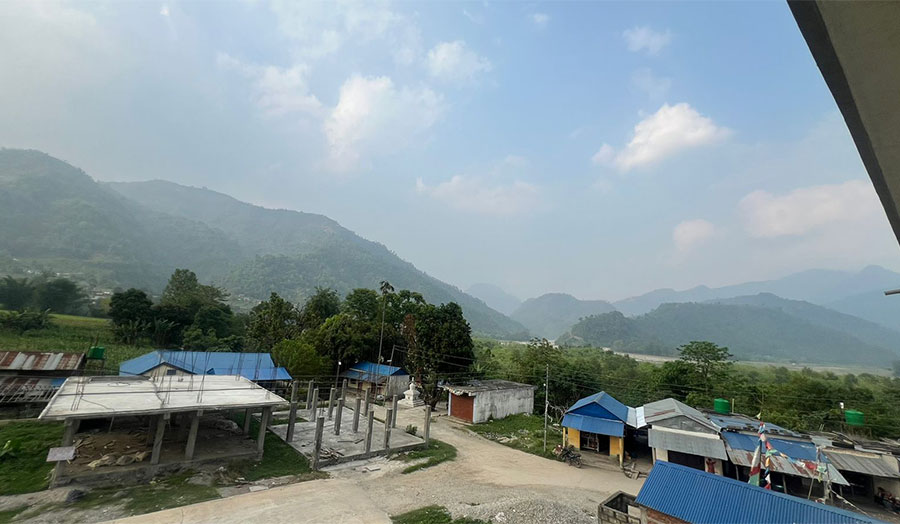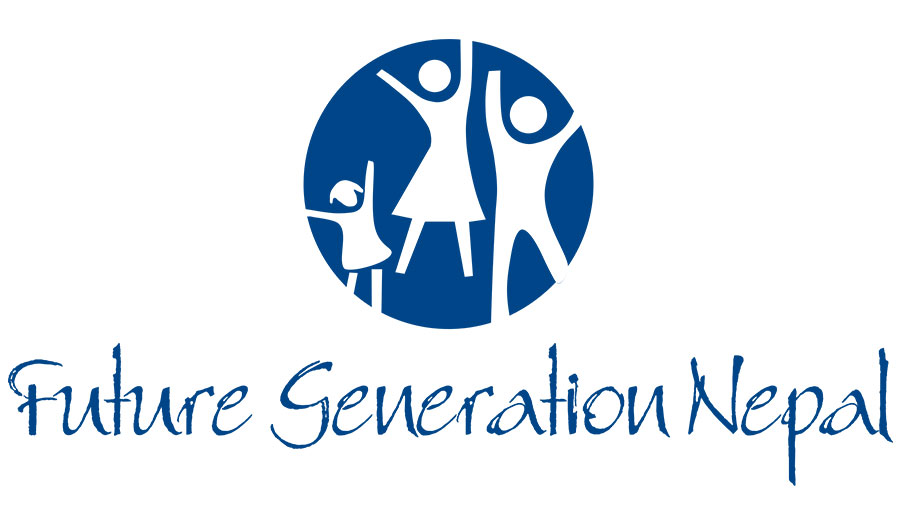This research project is led by Dr Shovita Dhakal Adhikari, Senior Lecturer in Criminology and Sociology in the School of Social Sciences and Professions. The project aims to examine the policy and practice of deinstitutionalising care in response to orphanage trafficking in Nepal.

Image: Raksirang Rural Municipality in Nepal, where fieldwork for this project will be carried out.
Project Lead
This research is funded by a BA/Leverhulme Small Research Grant 2023/24
More information
Child trafficking is a global issue. According to the United Nations Office on Drugs and Crime (UNODC) (2022), children make up almost half of the undetected victims of trafficking and the trafficking of children mainly occurs in low-income countries. In South Asia, children as young as 12 are trafficked for the purpose of forced labour in the domestic work sector, brick kilns, small hotels, and the garment and agricultural industries (UNODC, 2022). Attempts to enforce effective anti-trafficking initiatives have therefore drawn the attention of policy makers as well as becoming an important agenda item in the South Asian context (Kaufman and Crawford, 2011; Huda, 2006).
Nepal, like many other South Asian countries, is a source and transit point, as well as a destination, for traffickers (Dhakal Adhikari and Turton, 2019). The National Human Rights Commission of Nepal (NHRC) (2019) reported in 2019 that approximately 1.5 million Nepalis are at risk of being trafficked every year for forced labour and sex trafficking. Children’s vulnerabilities are heightened during periods of conflict, natural disaster, and displacement, and they are at increased risk of exploitation and trafficking. Implementing the vision of better protection for children has become challenging in Nepal, where children’s experiences are shaped by multiple socio-economic and cultural factors, including, amongst others, child labour, Kamaiya (bounded labour), institutional care and child marriage (Dhakal Adhikari and Turton, 2019).
More recent studies have highlighted the intersections between orphanage trafficking, child exploitation and institutional care in Nepal (Lama et al., 2023; van Doore, 2022; van Doore and Nhep, 2023), an area that remains under researched. The proliferation of institutions and orphanages as a child protection response to various man-made and natural disasters (van Doore and Nhep, 2021), has made the issue even more contentious.
Orphanage trafficking is a form of trafficking to which children in institutional care are subjected (e.g. children are bought and sold into institutional care for the purpose of exploitation and profit) (van Doore and Nhep, 2023). However, there is no explicit mention of orphanage trafficking in either the international convention (UN Trafficking Protocol, 2000) or in Nepal’s national law (Human Trafficking and Transportation Act 2007) (van Doore et al., 2023), thus obscuring intersections between institutional care and exploitation as a serious policy challenge.
Alternative care (informal kinship and foster care practices) in Nepal can be traced back over several centuries (Lama et al., 2023). In recent years, there has been an increasing focus on the deinstitutionalisation of care, mainly by strengthening forms of alternative care (e.g. kinship, and foster care, both formal and informal) in response to child protection issues in Nepal (ibid). The Government of Nepal is fully committed to ending the institutionalisation of children except as a last resort or when it is necessary.
Previous studies have outlined the unintended consequences of anti-trafficking interventions, such as raids and rescue efforts, in different contexts (Ahmed and Seshu, 2012; Cojocaru, 2016; Dottridge, 2007; Ghosh, 2009; Parmanand, 2019). However, the practice of alternative care in response to anti-child trafficking remains under-examined (van Doore and Nhep, 2023) in South Asia generally, and particularly in Nepal.
The project aims to examine the policy and practice of deinstitutionalising care in response to orphanage trafficking in Nepal. In doing so, it aims to:
- Undertake systematic analysis of the extent to which deinstitutionalising care policies and practices have been applied in the context of anti-child trafficking in Nepal.
- Examine the role of alternative care and the lived experiences of children and young people in alternative care, particularly their understanding/perceptions of risks and vulnerabilities and how they respond to those risks.
- Explore whether or not alternative care (kinship, and foster care, both formal and informal) is sufficient to block departures into risky and exploitative conditions to reduce vulnerability to trafficking.
Drawing on social control theory (Hirschi, 1969; Vocks and Nijboer, 2000; Vijeyarasa, 2015), this project will explore whether or not alternative care (kinship, and foster care, both formal and informal) is sufficient to block departures into risky and exploitative conditions to reduce vulnerability to trafficking. Social control theory particularly emphasises the role of the family, not only as provider of attachment, but also as a (economically, socially or emotionally) supporting network (Vocks and Nijboer, 2000). Theoretically, the project will contribute to a better understanding of family dynamics in the context of orphanage trafficking and the effectiveness of alternative care (both formal and informal) as a form of social control.
The methodological approach of this project is co-production, which allows to bring together different social worlds including practitioners, academic, community, and vulnerable group together for a single goal. This project is designed in collaboration with the local partner, Non-Government Organisation (NGO) Future Generation Nepal that work in the area of deinstitutionalisation of child care homes including rescues, manage temporary safe houses, family reintegration and alternative care in Nepal.
The project will run from 1 June 2024 to 31 May 2026. This project will be conducted in four phases:
- Stage 1: At the outset, existing policies, regulations, government and NGO’s report on prevailing alternative care practices, will be reviewed to understand the context of deinstitutionalisation of care in Nepal.
- Stage 2: Field work will be carried out in Raksirang Rural Municipality (a rural municipality - reports suggest that is one of the main source communities where most children are displaced or trafficked into poor and illegally run orphanages) in collaboration with the local partner: including 20 semi-structured interviews with key actors of the community, 10 focus group discussions with families and community members including women’s group and children’s clubs; and 20 in-depth interviews with children and young people to explore their lived experiences in alternative care; and ethnographic observation in the community where a number of anti-trafficking prevention programmes operate.
- Stage 3: This phase involves analysing all gathered data so that it can inform future policy and practice.
- Stage 4: The final phase involves sharing workshop/dissemination event in Nepal targeting policy makers, media and practitioners.
The project aims to co-create previously unheard narratives of alternative care in response to orphanage trafficking. It is hoped that it will provide a richer understanding of an issue as complex as deinstitutionalising care, and anti-child trafficking interventions, and will lay foundation to identify/produce a set of potential interventions to strengthening alternative care so as to create a safe space for children at risk in Nepal.
The outputs of the project will be one conference paper, two journal articles and a two-page research brief in Nepali language.
To ensure that project findings are used by researchers, community-based organisations, media, policymakers and wider general public, findings will be disseminated as widely as possible, including: (i) wider scientific/research communities via journal publications; (ii) sharing workshop/dissemination event in May 2026. The local partner/research collaborator in Nepal, Future Generation Nepal, will coordinate with stakeholders and host this event. This event will offer a platform for a rich discussion about potential interventions to create a safe space for children at risk in Nepal. (iii) Project findings will also be shared on a wider platform (e.g., Global Diversities and Inequalities Research Centre at London Metropolitan University, dedicated social media platform, Websites of Future Generation Nepal). The project findings will be presented at relevant national conferences in Nepal.
It is also hoped that the project findings will inspire a number of creative projects. These will emerge from discussions with research participants and project’s local partner but are likely to include verbatim theatre, storytelling, dance and craft-related projects.
This project is led by Dr Shovita Dhakal Adhikari, Senior Lecturer in Criminology and Sociology at London Metropolitan University. Dr Dhakal Adhikari has more than a decade of research experience in the field child trafficking, migration and entertainment sector in Nepal. She has successfully completed two British Academy Grants: (i) British Academy Writing Workshops Award 2021, ‘Promoting Publishing in the field of Gender and Development in Nepal’ (as a PI), and (ii) British Academy Special Research Grant 2020 ‘Fear, Stigma and Othering: The Impact of COVID-19 rumours on marginalised population groups of Nepal’ (as a Co-I).
The research is conducted in partnership with Future Generation Nepal, an NGO that work in the area of deinstitutionalisation of child care homes including rescues, manage ‘temporary safe houses’, family reintegration and alternative care.
Throughout the duration of the project, the PI will be supported by her academic mentor Professor Louise Ryan at London Metropolitan University.


